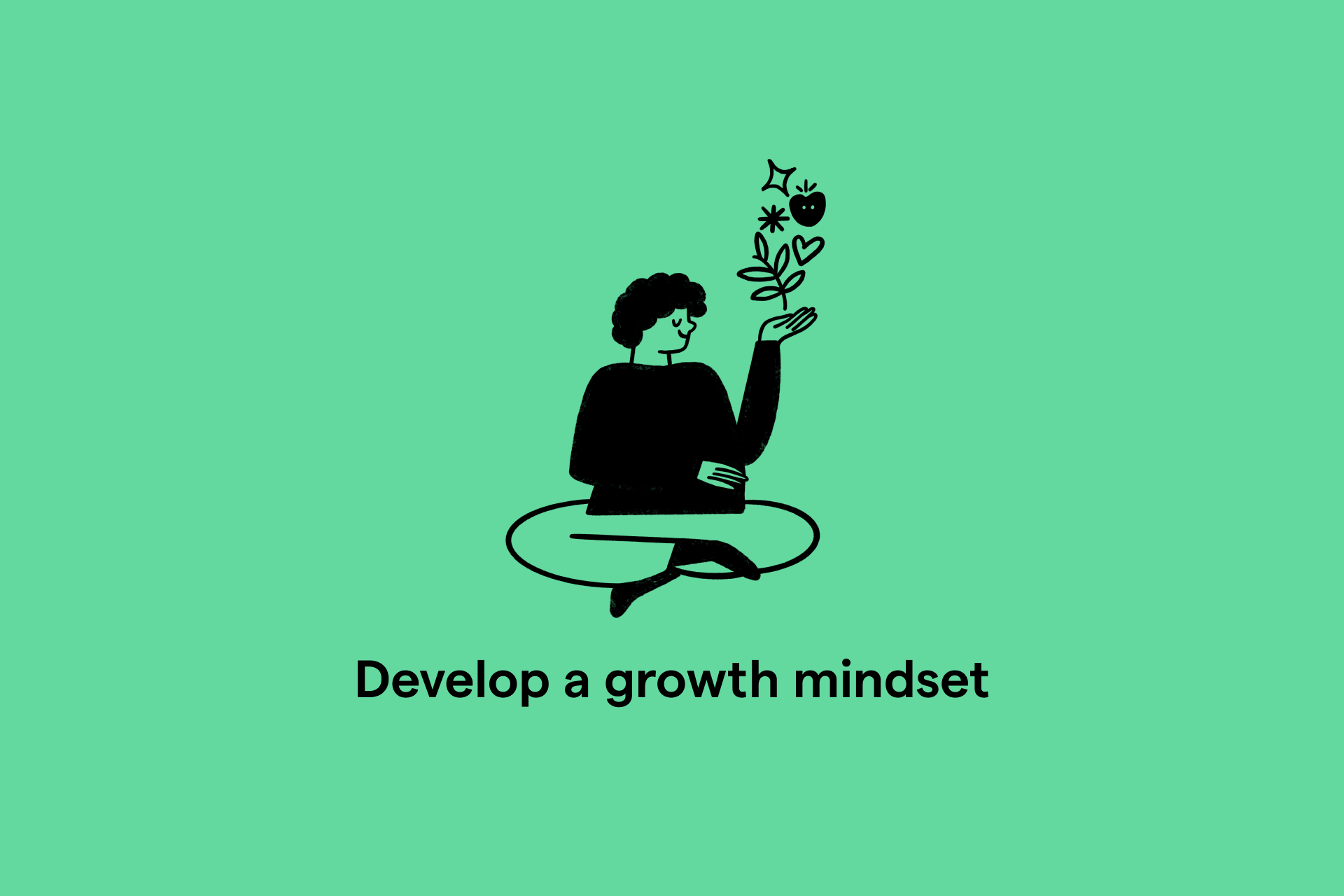
Individual
A self-facilitated program to boost your mental fitness for personal and professional growth
This website will offer limited functionality in this browser. We only support the recent versions of major browsers like Chrome, Firefox, Safari, and Edge.

Select the experience that fits your needs

A self-facilitated program to boost your mental fitness for personal and professional growth

A self-facilitated mental fitness program with exclusive pricing for 2 to 25 individuals

Explore coach-led mental fitness programs with workshops tailored to your organization
Growth Mindset

The term “growth mindset” was coined by Carol Dweck, Professor of Psychology at Stanford University and a leading researcher on motivation and mindsets. Dweck’s seminal book, Mindset: The New Psychology of Success, put the concept of a growth mindset on the map in 2007. Since then, educational institutions have embraced the practice of developing a growth mindset in order to help students reach their full potential. More recently, organizations and companies are promoting the development of a growth mindset as a way to inspire and motivate their teams to greater success.
According to Dweck, a growth mindset is based on the belief that your “most basic abilities can be developed through dedication and hard work—brains and talent are just the starting point.” A growth mindset believes that you can continuously improve yourself and grow if you apply the necessary effort.
Conversely, Dweck describes a fixed mindset wherein “people believe their basic qualities, like their intelligence or talent, are simply fixed traits.” Those with a fixed mindset believe they are stuck with predispositions, unable to improve through consistent effort continuously.
It is important to note the implications of having a growth mindset vs. a fixed mindset. Your mindset determines how you respond to setbacks, challenges, effort, feedback, and risk-taking. People with a fixed mindset tend to push back or resist growth. Those with a growth mindset see continual opportunities to learn and grow, even in the face of setbacks and challenges.
Setbacks: A fixed mindset sees setbacks as final and devastating. A growth mindset sees setbacks as expected and useful for growth and learning.
Challenges: A fixed mindset says challenges increase the chances of failure, further fueling self-doubt. A growth mindset says challenges are necessary for growth, learning, and success.
Effort: A fixed mindset views intelligence and abilities as inherent and effort as unnecessary. A growth mindset embraces effort and seeks continued growth.
Feedback: A fixed mindset avoids feedback, even if it is constructive. A growth mindset values feedback as a necessary part of improvement.
Risk: A fixed mindset avoids taking creative risks, as these may lead to uncertainty, setbacks, and failures. A growth mindset pursues opportunities to be challenged and to apply effort to learn and grow.
Growth mindsets and fixed mindsets are closely mapped to Saboteur and Sage behaviors. Building the muscles of mental fitness is critical to helping your team cultivate a growth mindset. Mental fitness in the Positive Intelligence® (PQ) framework involves intercepting your Saboteurs (your self-sabotaging mental patterns) in order to shift to using your Sage brain (self-mastery).
In the PQ Program, Saboteurs are described as the voices in your head that generate stress and negative emotions. They negatively impact the way you handle work and life’s challenges. They sabotage your potential for happiness and they decrease your performance.
Your Sage is your positive self. It has 5 Sage Powers — Empathize, Explore, Innovate, Navigate, and Active — that help you handle life’s challenges with a more positive mindset. The Sage Perspective allows you to see that every problem or challenge can be converted into a gift and opportunity.
It is impossible to fully engage your Sage without first intercepting your Saboteurs, starting with the Judge, the master Saboteur. The Judge is the universal Saboteur that afflicts everyone. It beats you up repeatedly over mistakes or shortcomings, warns you obsessively about future risks, and wakes you up in the middle of the night worrying. It also gets you to fixate on what is wrong with others, yourself, or your circumstances.
The Judge impacts mindset in two ways: Judging Self and Judging Circumstances. The Judge of Self tells you that setbacks are evidence of your lack of capability and worthiness. It also makes it too painful to ask for important feedback from others. The Judge of Circumstances does not see setbacks as opportunities to learn. It encourages you to shy away from risks and challenges that are critical to developing a growth mindset.
The Saboteur way of motivating your organization or yourself to grow will tell you that you aren’t working hard enough or doing enough; it is shame- and guilt-based. It is tiring, devastating, and often backfires rather than succeeds.
The Sage Perspective shows you how every outcome or circumstance, including setbacks, can be turned into a gift and opportunity. This is the essence of a growth mindset.
Additionally, the 5 Sage Powers each play an important role in continuous improvement. The Sage Powers recharge your mental and emotional energy and encourage blameless exploration of circumstances and events. The Sage way of motivating looks at everything that is working well now to fill you with joy and accomplishment that fuels positive momentum. True continuous growth requires a Sage approach powered by empathy and love for yourself.
Whether you’re working on cultivating a growth mindset as an individual or as part of a team, the results are clear. Adopting a growth mindset is critical to achieving peak performance. Dweck’s research shows that those who participate in growth mindset development programs within organizations, companies, and institutions report significant impacts on employee performance. Employees of growth mindset companies reported the following increases:
47% likelier to say that their colleagues are trustworthy
34% likelier to feel a strong sense of ownership and commitment to the company
65% likelier to say that the company supports risk-taking
49% likelier to say that the company fosters innovation
1. Mindset is on a spectrum. You may be working on being in a growth mindset most of the time, but every person is a mixed bag of fixed and growth mindsets. You will exhibit both mindsets throughout life. To prevent discouragement, it is important to remember that you are a work in progress and that mindset is on a spectrum.
2. Growth mindset is not all that matters. There are definite differences in your brain wiring and your predispositions that impact your abilities throughout life. Effort is essential, and attitude matters. However, if you assume success is all about effort, you may be disappointed and feel disempowered. Your approach must be balanced between acknowledging that success is a combination of your predispositions and applying consistent effort.
3. Success requires effort, but not hard effort. Research shows that willpower is an exhaustible resource and not enough for a sustainable practice. For this reason, you must learn to shift your brain activation to a place that doesn’t feel resistance anymore so you can work smarter, not harder. To put this into Positive Intelligence terms, Saboteur mode causes you to push harder and harder, but the way of the Sage is the way of ease and flow.
Mental fitness is foundational to cultivating a growth mindset. Simply embracing the idea of becoming a growth mindset organization is about 20% of the process of growth mindset development. The other 80% is accomplished through rewiring the brain and building the mental muscles needed to shift your team’s thinking. When your team learns to intercept their Saboteurs and embrace their inner Sage, you can maximize the group’s potential for improving performance, team dynamics, and team wellbeing.

